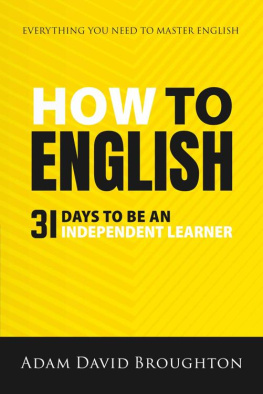How To English
Copyright 2019 by Adam David Broughton
All rights reserved.
Edited by Jennifer Renart at Next Step English
Cover and book design by Vincent Vi
No part of this book may be reproduced in any form or by any electronic or mechanical means, including information storage and retrieval systems, without permission in writing from the author, except by a reviewer who may quote brief passages in a review.
For every student I have ever taught, without whom this book would never have been written. Together, you taught me more than I could ever teach you.
Contents
Preface
Well done for buying this book.
Youve just walked half the journey. When you finally decide that now is the time to make progress and now is the time to take control of your learning, you instantly get past the most difficult part of learning.
What is this book about?
To answer that question, I first need to tell you why I wrote this book.
I wrote this book as a solution to the biggest and most common problem that every English learner faces at some point. That problem is frustration.
It starts when they stop making progress in English. It gets worse when their level starts to go down. Then they get desperate when nothing they do helps them improve.
Then they lose hope.
The fire in their belly disappears, they stop feeling motivated, and they think that someone else will help them improve. What they dont know is that nobody is coming to help them.
In order to make progress, you need that fire in your belly. That fire is the feeling that you have control over your own destiny. We humans are most motivated when we feel that our actions contribute to our own success. We are least motivated when we feel that we have no control over our own success; the feeling that someone else is deciding our destiny for us, and that there is nothing that we can do to help ourselves.
Let me tell you a story about taking control of your own destiny.
Many years ago during the second year of my teaching career, I had a class with two students that completely changed the way I teach.
These two students were Anton and Mohammed; one from Russia, the other from Yemen. Two absolute beginners.
It was winter in Brighton, England, which was not a very busy time of the year in the international English school I was teaching in. Anton and Mohammed were the only students in my A0 class.
The first class was how to greet people and introduce yourself, the alphabet and numbers. Progress was slow.
They had a lot in common. They were both the same age, both their families worked in the oil industry, and they were both learning English to be able to get a job in the industry.
After the first week, Anton started to attend fewer and fewer classes. He told me that he had joined the local golf club and was playing golf most days.
Mohammed attended class religiously. He was always on time, always did his homework and always made an effort.
As was expected, Mohammed finished the three-month course ready to start the next level, or even an A2 course if he pushed himself.
Anton ended the course with less than 50% attendance and never did his homework. When he did come to class, he asked me questions about grammar, vocabulary and expressions; things he had heard his new golf friends say.
He finished the course with a good B1+. He could have a conversation about any topic and had become a confident English speaker. From A0 to B1+.
In three months.
Let me tell you, three months in a country is not a long time. He used the time perfectly.
Mohammed was a great student and achieved what standard teaching practice told him he would achieve. Anton, however, took control of his own learning. He listened carefully to what native speakers said to him and what he read. He asked questions continuously about the language and filled his time with real-life practice.
The perfect recipe for learning a language.
That class taught me two very important lessons.
The first is that its not what you do in English class that determines how much progress you make. Its what you do when you are not in class.
The second is that it isnt so important what you learn in English. What is more important is how you learn English. In other words, how you learn English is more important than what you learn in English.
I teach people how to learn English, not what to learn in English. I teach them how to take control of their English learning so that they can get the results they want.
I teach my students to be like Anton.
The good news is that making progress in English can be easy. The only problem is, you dont know how to .
And that is exactly what this book is about. I am going to teach you how to learn English. When you learn that, you find that you stop feeling frustrated with English and you start making more progress than ever.
When you learn how to learn, you never need to worry about what you learn.
Its time to stop feeling frustrated. Its time to take control of your English. Its time to start making the progress that you have always wanted.
I hope you enjoy reading this book as much as I did writing it, and I hope you enjoy the journey to English mastery.
Introduction
Learner frustration
Every human needs to be moving forward.
I love my job. I really do.
Whats the best thing about my job?
The best thing about my job without any doubt is watching my students learn. When my students learn, I can see their faces respond to this new knowledge. When I teach my students something new or interesting, you can see little light bulbs lighting up in their heads. Its a great feeling and the reason I go back into the classroom every day.
But of course, every job has its pros and cons.
Whats the worst thing about my job?
The worst thing about my job is what I call learner frustration . Unfortunately, its something I see every day.
Learner frustration happens to every learner at some point, and its not always a bad thing. Most of the time it can actually motivate you.
Heres an example.
I play the guitar. Ive played the guitar since I was about fourteen or so. The learning process for the guitar has never been continuous progress. Its not linear. Its more like a set of stairs. Progress is flat and I dont improve, although I practise regularly. That makes me frustrated. Then suddenly, I move up a level. I jump up to the next step, and I feel very motivated again. After a while, progress starts to go flat again. Then suddenly, I jump up another level. And the whole process repeats itself
Its perfectly normal to feel frustrated sometimes. Its the normal learning process. It shows that you want to make progress, and it makes you work more and put more effort in so you can jump up a level again.
The problem is when you go a long time without making progress. This is when learner frustration can really start to have a negative impact on your learning.
In the example about me and the guitar, I experience learner frustration. However, its not a big problem because it doesnt last very long. In fact, it can actually help me.
Learner frustration starts to be very problematic when it lasts for a long time.
Imagine you have a headache. It feels bad, and you get frustrated and annoyed with the headache. But when the headache goes away, you feel great again and happy that you no longer have a headache.
Now imagine that headache doesnt go away. It becomes horrible and eventually, you start to think that it will never go away.
Then you start to lose hope.
Maybe you even think that having a headache all the time is normal. The difference between an acute headache and a chronic headache can have drastic effects on your life.
Next page










